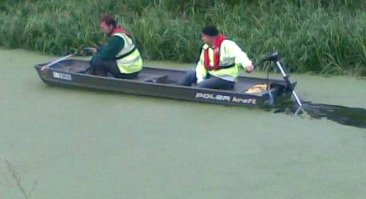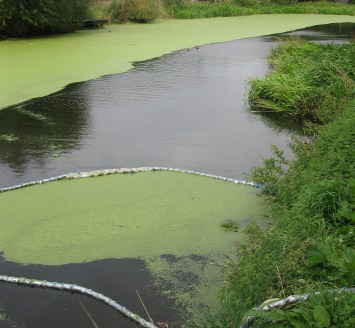THERE is a fight on at the moment to clear the duckweed from the waterways, with British Waterways out in force tackling the problem.
There was a cancelled attempt last week on the Swinton Arm of the Dearne & Dove Canal, as it was found to be the wrong weed that weevils were to be used for destroying, and though that species of weed had been eradicated by spraying the duckweed was still rife.

Taking action
BW and Rotherham Council are taking action by deploying a workboat on the canal to collect and remove as much of the weed as possible, as this is the only way to clear it from the waterways. At the same time the litter which collects in the natural collecting point of the weed can also be removed.
 Although duckweed is a very small plant, it is a voracious grower, and can multiply rapidly, covering the surface of a waterway with thick mats in a matter of weeks. This reduces light and oxygen levels in the water, killing fish and other wildlife.
Although duckweed is a very small plant, it is a voracious grower, and can multiply rapidly, covering the surface of a waterway with thick mats in a matter of weeks. This reduces light and oxygen levels in the water, killing fish and other wildlife.
Dragged out
The picture shows a net being used to pull the weed in, after which it is removed from the water.
Determined
Jonathan Hart-Woods, Environment Manager for British Waterways, explains:
"British Waterways are determined to make a real difference and ensure a more effective approach to the management of these plants, despite the difficulties of effectively controlling the spread. This is becoming a big issue for the waterways and one that we can't afford to be complacent with. The allocation of already stretched resources has been essential for its success and demonstrates our ongoing commitment to protecting the ecology of the waterways."
"As the warm weather continues, there's a danger that these weeds will take over completely, so we're taking these measures as a pre-emptive strike in getting rid of this weed. It is very difficult to contain the spread but we're hoping that this clean up effort will be effective."
More than £400,000
We are told that last year British Waterways had to spend more than £400,000 on clearing all species of aquatic weed from its network of canals, rivers, reservoirs and lakes that it cares for, with around £50,000 being spent in Yorkshire alone.
Many of these invasive weeds are freely available to buy as ornamental water plants in garden centres across Britain, but people dump them down a drain so they eventually end up in the waterways and multiply.
It is advised that if you already have these plants in your garden, and need to dispose of them, don't put them down the drain or in the rubbish. Instead, compost, burn or bury them.
